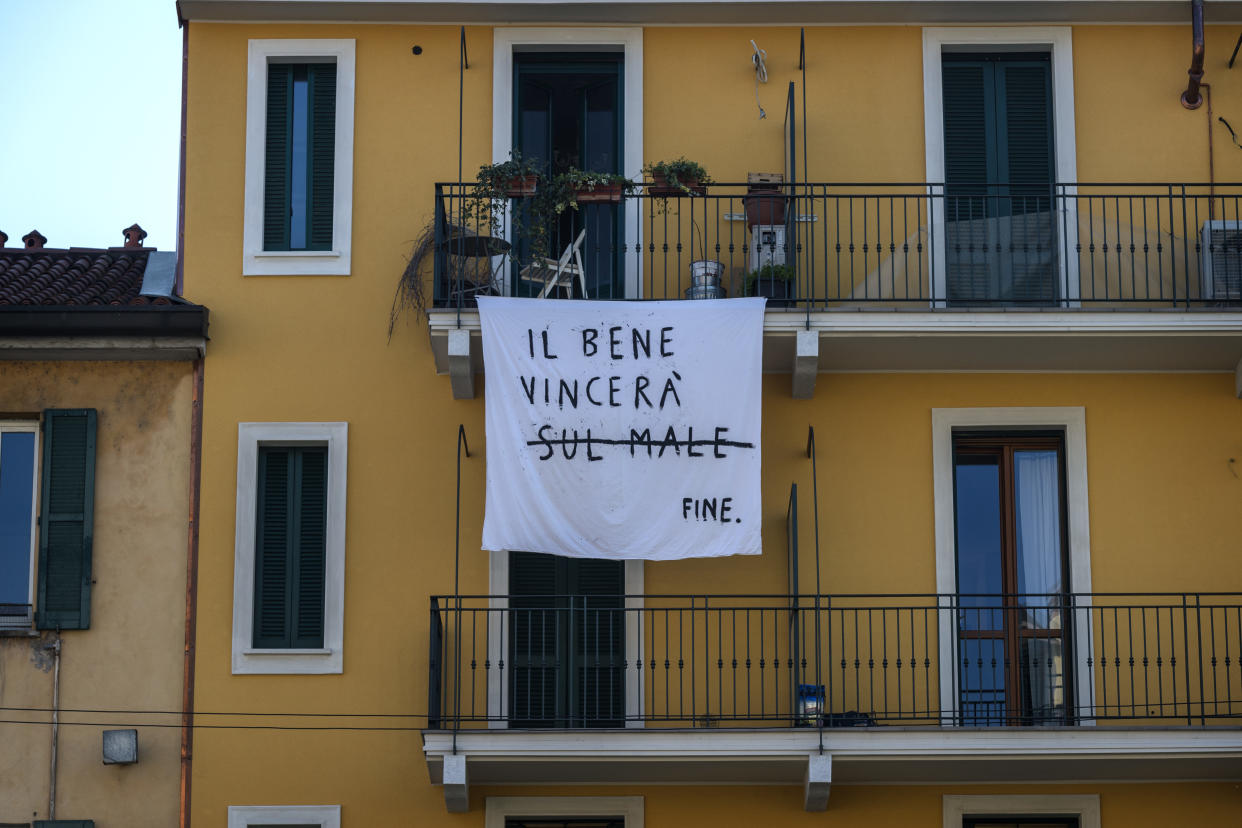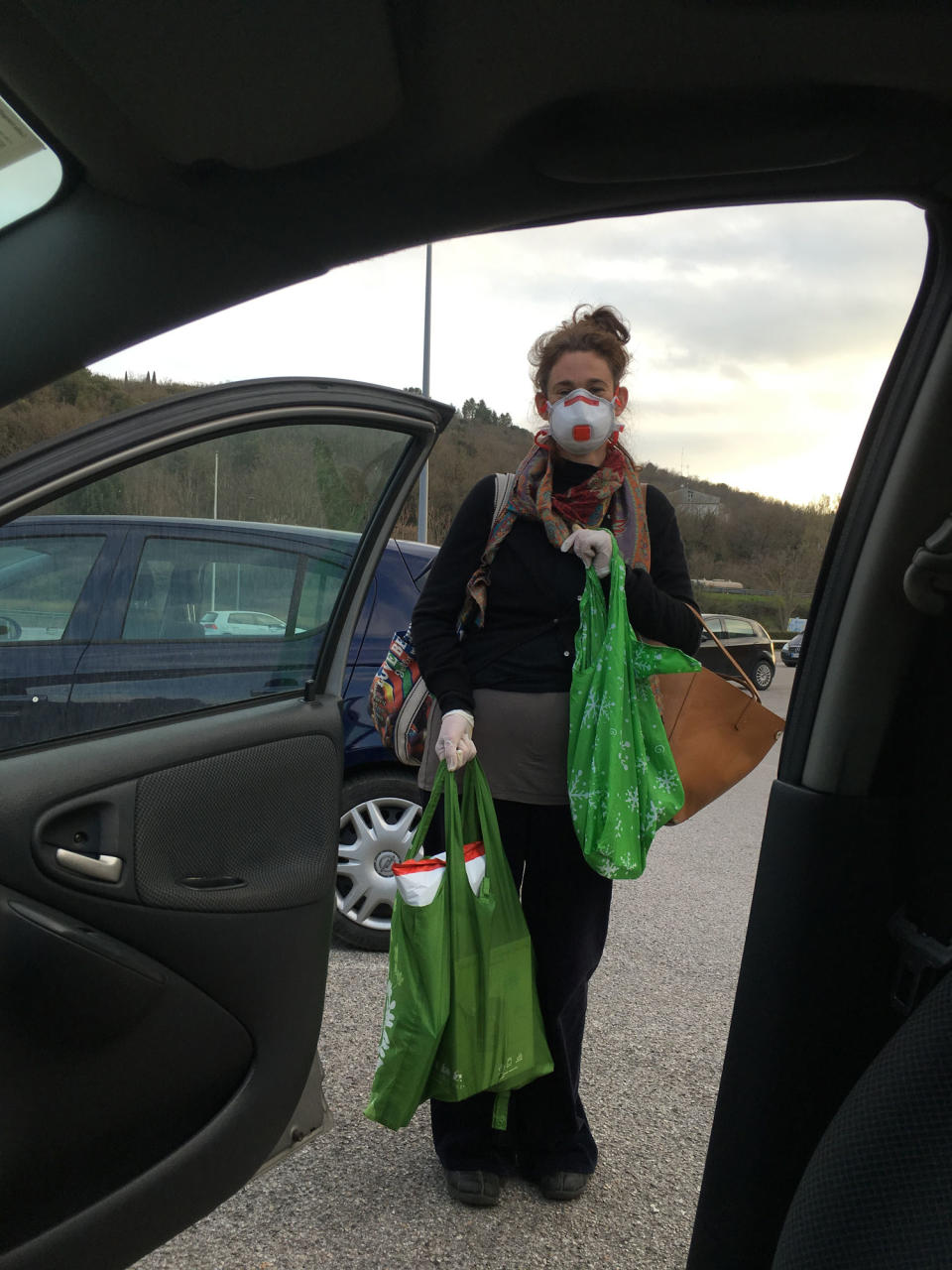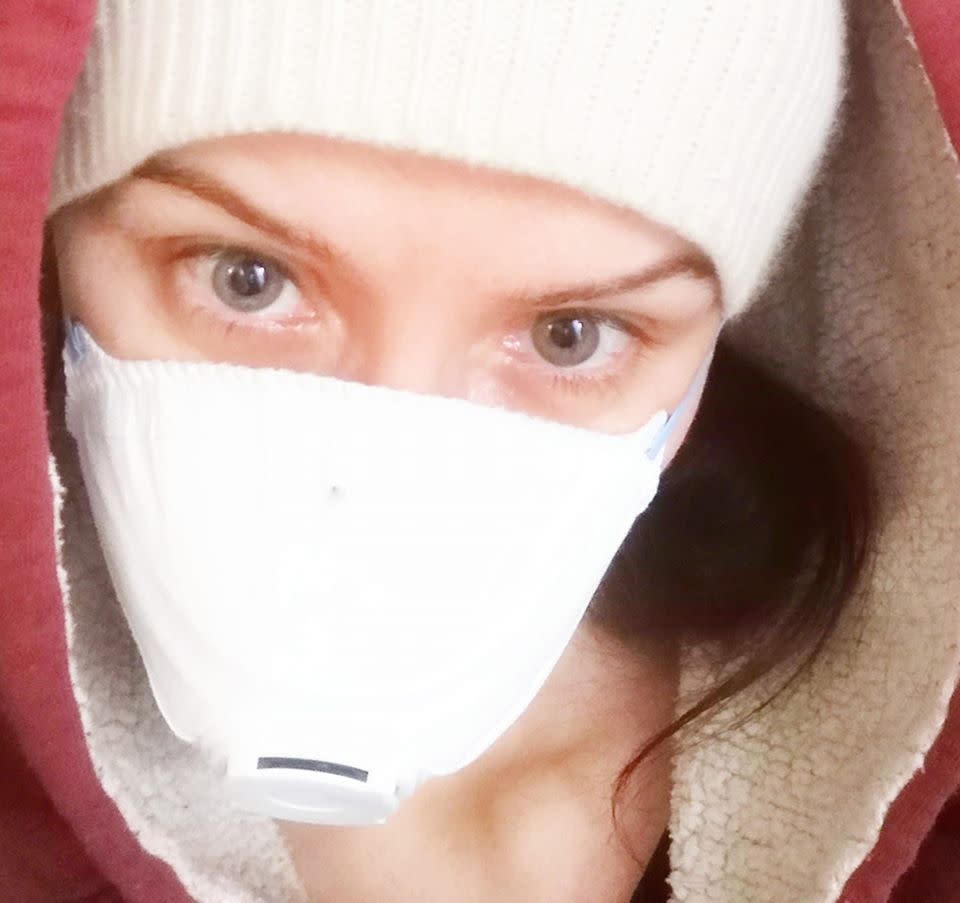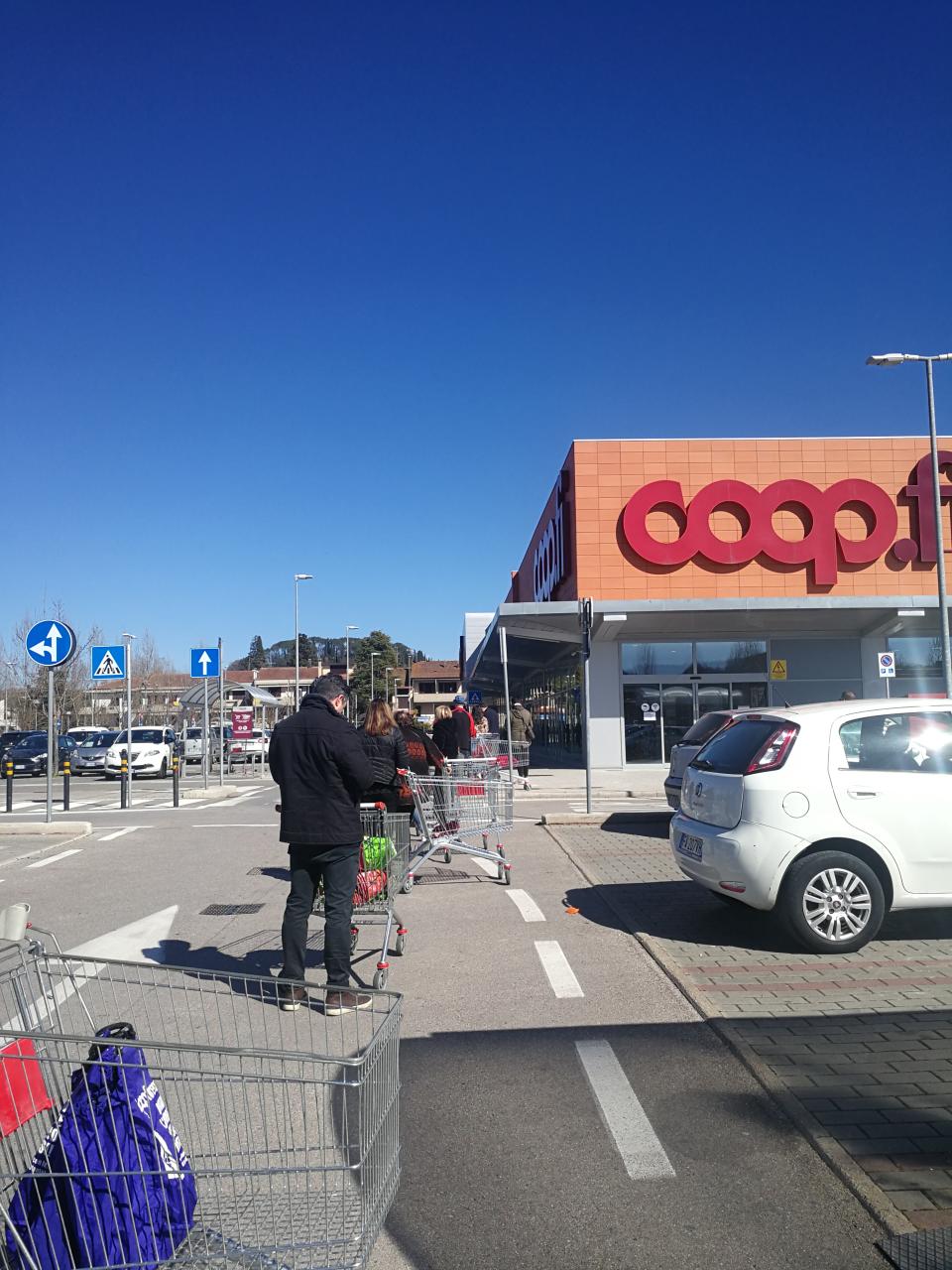Italy's coronavirus lockdown: 4 women share what it's like to live in isolation

On Sunday, the Milan-based filmmaker collective A THING BY released a video in which several Italians — now living under lockdown following the coronavirus outbreak that has claimed more than 2,000 lives in the country — expressed what they wish they’d known just 10 days prior, before their lives dramatically changed. They spoke of going to the gym and restaurants, and shrugging off concerns over the coronavirus. But infections and deaths skyrocketed, and now they’re “working deadly shifts at the hospital” and living “in a surreal situation” — a fate they hope others can avoid.
The comments expressed in the video, which has gone viral, echo those made by people — both expats and Italian natives — who spoke to Yahoo Lifestyle about their experiences living under lockdown, confined to their homes and fearing for their vulnerable loved ones. While none had personally known anyone who’d tested positive for COVID-19 so far, the lockdown has prompted a variety of other hardships: lost income, postponed weddings, feelings of social isolation and tensions with those in the north of Italy, where the outbreak’s first cases appeared, who broke red zone guidelines and traveled south, necessitating a nationwide quarantine.
They also shared moments of relief and levity — some of which, like opera performed from balconies, have gone viral — including dinner parties conducted over Skype, conversations with friends over FaceTime and even games of Bingo, with the numbers called out from afar to quarantined neighbors.
Here, they share their experiences, from working to protect elderly relatives, to shopping under lockdown.

Katy Thomas, 40, Canadian expat, travel blogger and violin maker living in Corciano with her husband and in-laws in a two-family home
“We've been taking the shutdown seriously. With older family members living next door, we stopped seeing friends three days before the shutdown. We're lucky as we work from home as violin makers and can limit clients coming as well. We need to bring a form around with us if we leave the house and ID stating why we're out and what we're doing and for how long. While our violin-making business shouldn't be terribly hurt, we're already hearing from friends and clients who are struggling. One has a restaurant which has been shut down. Another friend has a travel business and has had everything canceled. But from everyone we've spoken to there's optimism that if we do all stay home, it will pass sooner. There’s also confusion. It takes a few days for things to get translated into English, and there are many foreigners here. With things changing so frequently no one knows what to do. It's now that Facebook groups for expats are being used to share info, get moral support and find out what others are doing.
“Last week we went grocery shopping and there were already boxes showing what a meter distance is for standing in line [to keep shoppers separated]. The cashiers have face masks and gloves. Contactless card payments are being pushed, which is shocking. This is a cash society. Only one person is supposed to go shopping from any household, so it falls on my husband to go for his parents and me, as I have yet to get an Italian driver’s license. [As far as supplies] toilet paper is all good, but there weren't eggs or ground meat. ... We normally go out for meals at least two or three times a week. 10 days in and I miss that! So much.
“Treats and challenges are how we're getting through this. I bought enough butter to try making croissants; my husband is building a box with just dovetail joints.
“All in all it’s totally surreal.”
Maria, 30, Italian native and full-time employee based in Milan but isolating in the countryside with her husband and child
“I am not having any physical contact with people outside my home, besides my husband who lives with me, so the general mood I feel is based on TV, the internet or my closer friends who I FaceTime different times a week. The first two weeks, the mood was quite surreal; people were panicking, with lots of confusion. Now the rules are clear for everyone: We need to stay home. It’s sad, but we follow the rules ... Sometimes you get frustrated staying in the same place or depressed about not going outside, but there is this common feeling like ‘together we can do it.’ It is a strange feeling.
“The supermarkets are running quite normally. You can find almost everything easily. The first days there has been this situation with people running to stores to buy everything, but the day after everything was in stock again. It’s quite difficult to find gloves and sanitizer gel, while face masks are impossible to find. We need to keep them for doctors and hospitals. I am following the rules going only to the pharmacy and grocery store and I can see few people around, just one person from each family. People are not staying around and chatting or talking that much. We’re always respecting a 1-meter distance from other people.
“I do smart work [work remotely] five days a week, with a young child seeking our attention. So we decided on a schedule dividing the day in hours (alarm at the same hour, breakfast, time to prepare, etc.) and the split house in different zones: “office,” place to play, etc. We try to have a routine like in a normal day not to go insane. Teachers share five videos a day with activities for kids to do, following the program they should have done at school.
“We are lucky enough to have a big family house to do this quarantine, but I have a lot of friends in Milan going insane due to the restriction, so we have a lot of video calls or challenges among our WhatsApp groups. Like a cooking challenge, playing the same song at the same hour or watching the same movie at the same time, these kinds of things. We stay connected in a virtual way. The approach for us is easy, but the sad thing is for grandparents who are not used to this technology. They might feel alone or isolated. People help them with grocery shopping or have phone lines dedicated to them, for them to talk with someone.
“[Not spending time with friends and family] is the saddest thing above all. We cannot see each other. Today I helped my friend with the grocery shopping because she is pregnant, and she prefers not to go around; she just takes some walks around her home. So I delivered her the bags, literally leaving them at the gate and saying bye from a distance. I miss them so much.
“The positive thing of this situation is that despite being physically distant, I feel so close [to loved ones], and I know it is the same for my friends because we share lots of thoughts during our FaceTime calls. I read a lot and based on social media there is this common destiny, common situation we are all living, so we are all supportive of each other.
“My friend sent me a poem, saying that now we know how sad it is to stay a meter away from another person. It’s true. I hope we will learn from this surreal situation.
“The thing I am thinking about the most is the future, the months ahead, when all of this will have an end. Maybe we’ll realize that this time is needed to understand how precious our daily life is — a kiss, a hug from your friend.”

Clelia Mattana, 42, Italian native and travel writer based in Sardinia
“This is now my 16th day of quarantine and I can only add one thing: It's way tougher than I thought at the beginning.
“I decided just over two weeks ago to stay home isolated from everyone to protect my elderly parents and the weakest people. I'm 42 years old and can work from home.
“The situation here is critical. People are scared, panic is setting in and I can't see my boyfriend who lives in Germany because they shut down almost all the flights to and from Italy. We don’t know when we can see each other again and I know so many couples in the same situation.
“Here where I live, close to Cagliari Elmas Airport, the situation is quite surreal. As soon as they told us that the whole of Italy was in lockdown, people assaulted supermarkets to buy food. Some people bought food online (like me) and many people from the south, including myself, blame the people from the north for escaping the red area that had been locked down on the previous days. All the southern people living in Milan and Lombardia jumped on trains to go back home, jeopardizing the whole country.
“In the south, we don't have a good health system and in a few days, if (as we expect) the cases will rise, it is going to be a disaster. There are a few voice messages circulating on WhatsApp from doctors in the triage in Milan and Brescia; they tell us how things truly are (not just the usual news on TV) and it's heartbreaking. Every day, due to the lack of ventilators and beds, these doctors need to decide who is going to have the chance to live and who doesn't.
“Now the police are starting to patrol the streets to make sure no one exits their village or city unless it's for urgent matters, but sometimes the police also deny you to move, as they did with some friends of mine who wanted to buy some groceries and were sent back. I am scared — my parents are over 70 and don't fully realize the seriousness of it all and want to prove that they are still ‘immune’ to all this, so I had to threaten them to steal the car keys or even lock them inside the house if necessary.
“Day-to-day life is different for all of us. Some companies use smart work, some others still force the employees to go to work with no protection. Hand sanitizers are nowhere to be found online or in the shops and gets stolen from the hospitals. I got mine before the panic was truly setting in. It’s a 1-liter bottle from Amazon UK because in Italy they were selling super-small bottles for more than €70, and incredibly people bought them as they are now out of stock.
“Many others are trying to create a home version of hand sanitizer but a lot of these experiments went wrong. I started using alcohol to disinfect things coming from the outside, and we started an online movement called #IStayAtHome (#Iostoacasa) because it's the only way to get out of this nightmare. Even TV personalities are sending messages and joining the movement.
“Two weeks ago things were pretty normal. They had just found the first case in Codogno but it was isolated, then things started to escalate pretty quickly and just weeks after the first case we are in a complete crisis. The economy is collapsing and the health system too, so people are confused, misinformed, angry and fighting with each other to find responsibility.
“We realize it's an emergency but we are split in two basically — those who tell the others (usually young students) to stay home, and those who literally say that they don't give a damn and are not willing to stop their lives for this. They are seen as selfish and irresponsible.
“I hope the other nations realize how bad this can get if they don't act immediately and do what we did in the beginning: underestimate it. My message is, please do not underestimate it. It's a real mess and people are starting to get super-scared, turning against each other and it can end quite badly ... For us, it happened so quickly that we are still recovering from the shock. Now that China is sending us some supplies we have more hope to cure more people, but the cases are still increasing despite all the restrictions and people are very concerned.
“It's ironic because now my motto is ‘Stay Home’ and a few years back I was featured in a few magazines online with my story of ‘braveness’ because I left everything behind to travel the world. I can't wait for this surreal situation to end to tell people to travel again, but right now I'm doing the opposite and discouraging everyone I know and have met all over the world to stay home if they don't want to be the ‘next Italy.’”

Judy, an American expat and Divina Cucina culinary tour guide living outside of Florence
“Many of the locals up north fled on trains before the midnight starting time for the lockdown. Doing so, they then contaminated everywhere they went as there was no real way to control where they went or if they would actually do a self-imposed quarantine. So our prime minister put the entire country on red alert.
“[The atmosphere] is odd. I live outside of Florence and cannot go down there, but see it is empty, like a ghost town. Many of the restaurants were offering to-go services for meals and adapted to keep a 1-meter distance between clients at the tables. Restaurants and shops can only do delivery now — no takeout. The weekly markets are closed where I am, but supermarkets are open.
“All my work was canceled. Working in tourism, most of us have not worked since November. This was the beginning of the season. Not traveling is fine; not working is the bad part. Living here and working seasonally, most of the people in the tourism industry have no way to make up the losses we are having right now.
“It is not the plague — we are not prisoners. We can go out and shop. We have food! And in Italy, the food and wine are fabulous.”
For the latest news on the evolving coronavirus outbreak, follow along here. According to experts, people over 60 and those who are immunocompromised continue to be the most at risk. If you have questions, please reference the CDC and WHO’s resource guides.
Read more from Yahoo Lifestyle:



